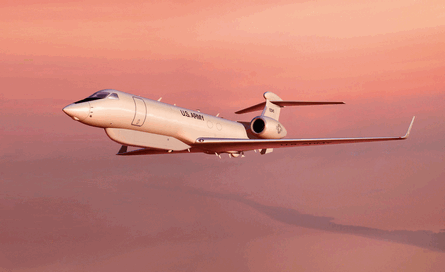The US Army is considering major changes to its acquisition strategy for a new Aerial Common Sensor (ACS) fleet that could stretch out the schedule and cost of the competition.
The service plans to award a winner-take-all, multi-billion dollar contract in the first quarter of 2009 to develop and produce 38 business jet-sized aircraft packed with intelligence-gathering sensors.
A draft request for proposals issued to industry in August has attracted interest from at least four prime contractors: Boeing, Lockheed Martin, Northrop Grumman/L-3 Communications and Raytheon.
Boeing has replied to the army that two key ground rules of the competition should be changed, says Paul Summers, the company's director of airborne signals intelligence campaigns. First, Boeing has urged the army to abandon the winner-take-all strategy and keep two contractors in the competition through at least the preliminary design review phase, he says. Such a change would be consistent with recent competition guidelines issued by the Department of Defense.
 |
|---|
© Boeing |
Secondly, Boeing has requested the right to propose its own subsystems. Current ground rules allow the aircraft platform and the moving target indicator radar to be unique, but other key subsystems such as the communications intelligence (Comint) payload, aircraft survivability equipment and datalinks, have been pre-selected.
Northrop acknowledges that the army is considering Boeing's recommendations, but prefers to keep the current rules, says Frank Moore, its lead executive for ACS. Northrop's Comint sensor - the airborne signals intelligence payload - is among the army-directed technologies.
The army's acquisition strategy reflects a low-risk approach adopted after the fiasco of its original ACS contract, which was cancelled in 2006 after the sensor payloads outgrew the Lockheed-developed platform based on the Embraer ERJ-145 regional jet.
The army's final strategy will be set by the Joint Requirements Oversight Council on 23 October, Moore says. An RFP could be issued in November if no major changes are made.
Boeing has teamed with Gulfstream to offer the G550 for the ACS deal. The agreement comes after Boeing's optionally manned G550 proposal lost the US Navy's Broad Area Maritime Surveillance contract to Northrop's RQ-4 Global Hawk unmanned aircraft system.
However, the G550 also remains under consideration by Northrop's team. The company is also considering Bombardier's Global Express XRS, but knows of no exclusivity agreement between Gulfstream and Boeing on the G550, Moore says.
Raytheon is also still mulling over an offer based on the UK's Global Express-based Airborne Standoff Radar system, confirming: "We are currently working with the army to evaluate the possibility of bidding."
Source: Flight International























